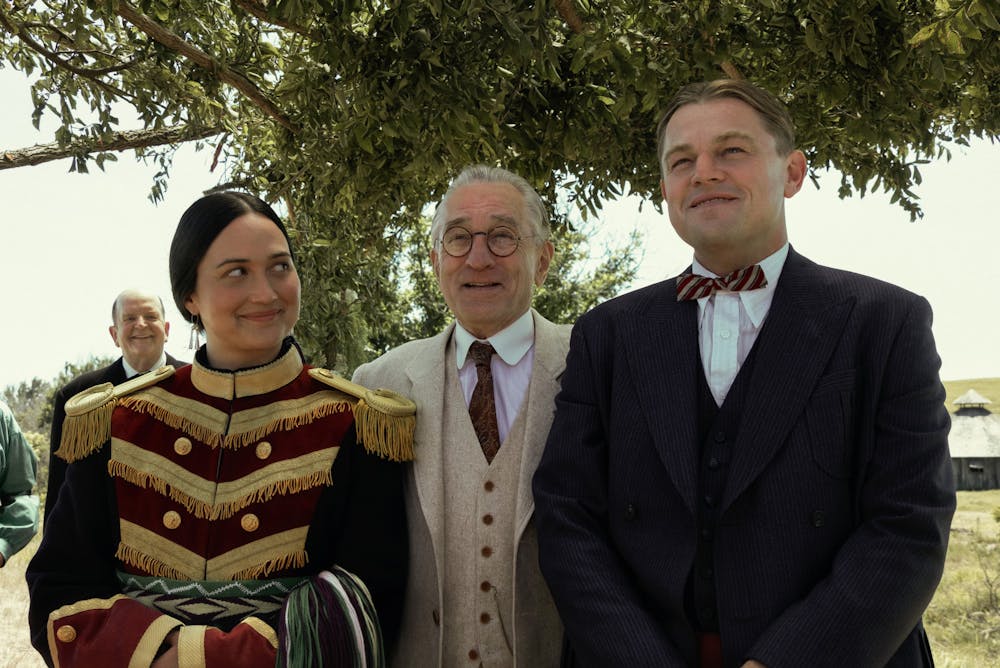Review: ‘Killers of the Flower Moon’ is monumental

Score: ★★★★★
Even prior to the release of “Killers of the Flower Moon,” online commentators were discussing the merits and, more often, the potential problems of the film’s three-and-a-half-hour runtime. This discourse, however, is entirely missing the point of director Martin Scorsese’s latest masterwork: “Killers of the Flower Moon” is a pointed, harrowing drama based on a true story about the exploitation of Native Americans and a criticism of American ignorance.
“Killers” follows Ernest Burkhart (Leonardo DiCaprio) as he returns from World War I and moves in with his uncle, William “King” Hale (Robert DeNiro). King lives among the Osage Nation, a Native American tribe that recently discovered oil on their land and has become the richest population per capita in the world as a result. As the film progresses, it becomes more apparent that King is not the friendly supporter he presents himself as, continually manipulating Ernest, his wife Mollie (Lily Gladstone) and the others around him.
While this set-up seems like it would evoke the violence and excitement that are commonplace in Scorsese’s other crime work, such as “Goodfellas” and “Casino,” the film’s power comes from its lack of either. Rather than making a flashy display of crime, the abhorrent actions of the characters are displayed as despicably as they actually happened. The look of the film is appropriately cold and distant, though laced with period-appropriate detail, and Scorsese’s legendary blocking and camera movements serve to highlight obscenity rather than glorify it.
As the film progresses, each moment compounds itself, evoking a sense of horror, hopelessness and dread that complements Scorsese’s greater statements about greed and exploitation. The audience is suffocated under the weight of the crimes, which both subverts the disposability associated with true crime stories in the digital age and allows the audience to question why this story has never been explored.
Of course, the film itself is a response to this question. A ruthless, uncaring population slowly creeps into the town of Fairfax, and the crimes central to the film are ignored until late into the long runtime, representing a general consensus of ignorance that existed both at the time of the story and today. Scorsese is less concerned with the ‘whodunnit’ and more with displaying the full depravity of the situation and our collective silence in response. The film’s central romance also conveys this, as the warmth that begins the film slowly is extinguished, creating a melodramatic conclusion analogous to the political one.
While this incredibly bleak perspective makes “Killers” sound dreary, it is deservedly constructed in this way and is an essential movie to see because of this. Each of the three lead performances is absolutely stunning — DiCaprio and DeNiro ascend beyond their stardom and transform into their ruthless, cold and, in DiCaprio’s case, oblivious characters. Gladstone is astonishing as well, portraying the simultaneous anguish and strength of the Osage people precisely. The pacing is also not an issue despite the monstrous runtime, as the editing keeps each scene moving forward and ensures the audience is left with just enough mystery to stay transfixed on the film. Frankly, most two-and-a-half-hour movies feel longer than this one.
Every single detail of “Killers” is ultimately focused and operates together to create an immense statement about American exploitation. Scorsese’s meditative style is perfected here, as the emptiness of the story and lack of excitement carefully evokes the grief central to the film. To be so in control of a project at 80 years old is monumental but unsurprising given the multitude of masterpieces Scorsese has created. “Killers” stands out amongst these, not only in terms of quality but particularly in its pointed reflection and emotional weight.
More from The Rice Thresher

Andrew Thomas Huang puts visuals and identity to song
Houston is welcoming the Grammy-nominated figure behind the music videos of Björk and FKA twigs on June 27.

Live it up this summer with these Houston shows
Staying in Houston this summer and wondering how to make the most of your time? Fortunately, you're in luck, there's no shortage of amazing shows and performances happening around the city. From live music to ballet and everything in between, here are some events coming up this month and next!

Review: 'Adults' couldn’t have matured better
Sitcoms are back, and they’re actually funny. FX’s “Adults” is an original comedy following a friend group navigating New York and what it means to be an “actual adult.” From ever-mounting medical bills to chaotic dinner parties, the group attempts to tackle this new stage of life together, only to be met with varying levels of success.

Please note All comments are eligible for publication by The Rice Thresher.